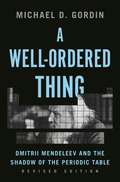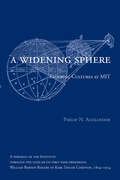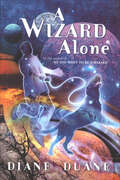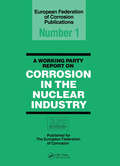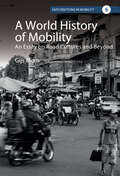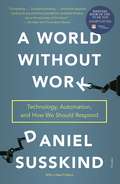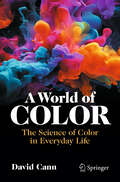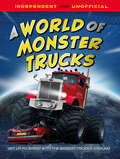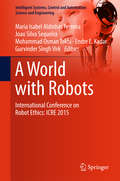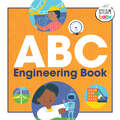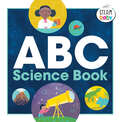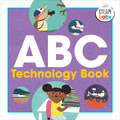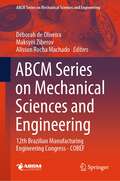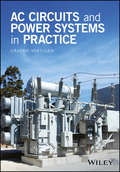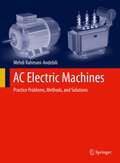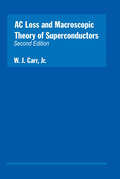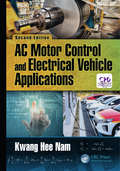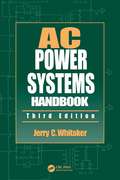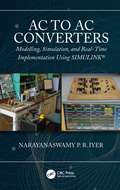- Table View
- List View
A Well-Ordered Thing: Dmitrii Mendeleev and the Shadow of the Periodic Table, Revised Edition
by Professor Michael D. GordinDmitrii Mendeleev (1834–1907) is a name we recognize, but perhaps only as the creator of the periodic table of elements. Generally, little else has been known about him. A Well-Ordered Thing is an authoritative biography of Mendeleev that draws a multifaceted portrait of his life for the first time. As Michael Gordin reveals, Mendeleev was not only a luminary in the history of science, he was also an astonishingly wide-ranging political and cultural figure. From his attack on Spiritualism to his failed voyage to the Arctic and his near-mythical hot-air balloon trip, this is the story of an extraordinary maverick. The ideals that shaped his work outside science also led Mendeleev to order the elements and, eventually, to engineer one of the most fascinating scientific developments of the nineteenth century. A Well-Ordered Thing is a classic work that tells the story of one of the world’s most important minds.
A Widening Sphere: Evolving Cultures at MIT
by Philip N. AlexanderHow MIT's first nine presidents helped transform the Institute from a small technical school into a major research university.MIT was founded in 1861 as a polytechnic institute in Boston's Back Bay, overshadowed by its neighbor across the Charles River, Harvard University. Harvard offered a classical education to young men of America's ruling class; the early MIT trained men (and a few women) from all parts of society as engineers for the nation's burgeoning industries. Over the years, MIT expanded its mission and ventured into other fields—pure science, social science, the humanities—and established itself in Cambridge as Harvard's enduring rival. In A Widening Sphere, Philip Alexander traces MIT's evolution from polytechnic to major research institution through the lives of its first nine presidents, exploring how the ideas, outlook, approach, and personality of each shaped the school's intellectual and social cultures. Alexander describes, among otherthings, the political skill and entrepreneurial spirit of founder and first president, William Rogers; institutional growing pains under John Runkle; Francis Walker's campaign to broaden the curriculum, especially in the social sciences, and to recruit first-rate faculty; James Crafts, whose heart lay in research, not administration; Henry Pritchett's thwarted effort to merge with Harvard (after which he decamped to the Carnegie Foundation for the Advancement of Teaching); Richard Maclaurin's successful strategy to move the institute to Cambridge, after considering other sites (including a golfclub in Brighton); the brilliant, progressive Ernest Nichols, who succumbed to chronic illness and barely held office; Samuel Stratton's push towards a global perspective; and Karl Compton's vision for a new kind of Institute—a university polarized around science and technology. Through these interlocking yet independent portraits, Alexander reveals the inner workings of a complex and dynamic community of innovators.
A Wizard: The Sixth Book In The Young Wizards Series (Young Wizards Ser. #6)
by Diane DuaneWhile Nita grieves over her mother's death, Kit tackles a challenge as dangerous as it is strange: Rescue a young wizard who has vanished on his first assignment. This new wizard is unlike any other--he's autistic and he's a magical prodigy. His power is enormous. Now Kit and his dog, Ponch, must track down the missing boy before the Lone Power finds him.
A Working Party Report on Corrosion Resistant Alloys for Oil and Gas Production: General Requirements and Test Methods for H2S Service (EFC 17) (European Federation of Corrosion Publications)
by Liane SmithThis book addresses the selection and qualification of corrosion resistant alloys for use in oil and gas field production facilities that handle raw and partly processed reservoir fluids at, and below, reservoir temperatures.
A Working Party Report on Corrosion in the Nuclear Industry EFC 1 (European Federation Of Corrosion Publications)
by European Federation Corrosion Working Party on Nuclear CorrosionFirst published in 1989. The EFC, incorporated in Belgium, was founded in 1955 with the purpose of promoting European co-operation in the fields of research into corrosion and corrosion prevention. In 1986 the EFC Working Party on Nuclear Corrosion was reorganised with the objective of concentrating on nine topics of relevance to the nuclear power industry. The group of experts in the Working Party. The new structure of the Working Party is based on the following topics: - Pressurised Water Reactors - Boiling Water Reactors - Fuel Elements (Cladding) - Advanced Gas Reactors - High Temperature Reactors - Liquid Metal Fast Breeders - Fusion Reactors - Reprocessing - Waste Management (Disposal). The first meeting of the Working Party following the restructuring was on the occasion of EUROCORR '87 in Frankfurt. The present volume has therefore been prepared and represents Number One in the series of EFC publications.
A World History of Mobility: An Essay on Road Cultures and Beyond (Explorations in Mobility)
by Gijs Mom MomAs a tool of globalized mobility, the car provides a useful barometer for charting the global development of socio-cultural, economic, technical, and political modernization. Shaped by prevailing gender and racial norms and popularized by a Western-driven car culture, it is a commodity whose access and use embodies wider inequalities. In this comprehensive world history of (auto)mobility, Gijs Mom draws upon his extensive research into the field to assess the past and present of road cultures, and hypothesize their future. Ranging from the impact of climate change to decolonization, this volume spotlights how profoundly ‘automobilism’ impacts our sense of identity and imagination.
A World Without Work: Technology, Automation, and How We Should Respond
by Daniel SusskindA New York Times Book Review Editors’ ChoiceFrom an Oxford economist, a visionary account of how technology will transform the world of work, and what we should do about itFrom mechanical looms to the combustion engine to the first computers, new technologies have always provoked panic about workers being replaced by machines. For centuries, such fears have been misplaced, and many economists maintain that they remain so today. But as Daniel Susskind demonstrates, this time really is different. Breakthroughs in artificial intelligence mean that all kinds of jobs are increasingly at risk.Drawing on almost a decade of research in the field, Susskind argues that machines no longer need to think like us in order to outperform us, as was once widely believed. As a result, more and more tasks that used to be far beyond the capability of computers – from diagnosing illnesses to drafting legal contracts, from writing news reports to composing music – are coming within their reach. The threat of technological unemployment is now real.This is not necessarily a bad thing, Susskind emphasizes. Technological progress could bring about unprecedented prosperity, solving one of humanity’s oldest problems: how to make sure that everyone has enough to live on. The challenges will be to distribute this prosperity fairly, to constrain the burgeoning power of Big Tech, and to provide meaning in a world where work is no longer the center of our lives. Perceptive, pragmatic, and ultimately hopeful, A World Without Work shows the way.
A World of Color: The Science of Color in Everyday Life (Copernicus Books)
by David CannThis book demystifies the intricate science behind the colors that surround us every day, making it accessible to readers of all backgrounds, from the crackling warmth of campfires to the iridescent glow of butterfly wings. Have you ever wondered why the sky appears blue, or why leaves turn golden in the fall? How do our eyes perceive color, and why do some creatures see the world in hues we can only imagine? Delve into the captivating world of color with this informative and engaging book as your guide. A rich assortment of colorful figures and photographs accompanies you on a journey from the tranquil depths of the ocean to the shimmering neon lights of the urban cityscape. You'll learn how things like fluorescence, refraction, and interference allow artists to manipulate color to evoke emotion, and how scientists harness it to revolutionize technology. How does the color of fireflies inspire cutting-edge display devices, and what can the mantis shrimp teach us about the evolution of color vision? Prepare to be dazzled as you embark on a journey through the spectrum of discovery. Are you ready to see the world in a new light?
A World of Monster Trucks
by Paul MasonDiscover everything you ever wanted to know about monster trucks, with up close photos in this independent and unofficial guide for children aged 7 plus.Produced by the same team as the best-selling A World of Supercars, this is a must for all fans of monster trucks! This book is full of the facts, stats and technical data that you want, and of course big, full colour photos of the monster machines. Find out which was the first ever monster truck, what happens at Monster Jam, which is the fastest truck, how the trucks perform tricks and MUCH more with this BIG guide.Contents: What makes a truck a monster? / Truck pulling and mud bogging / Bigfoot / Trucks of the 1980s / Monster Jam / Racing / Raminator / Monster engines / Bad Habit / Earth Shaker / Building the course / Lambo / Freestyling it / Grave Digger / Getting air / El Toro Loco / Megalodon / Northern Nightmare / ThunderROARus / Trick driving / Zombie / Maximum Destruction / Safety / Big Pete / Bakugan Dragonoid / Sparkle Smash / Monster Mutt / Mohawk Warrior / Monster-truck records / Glossary / Index
A World with Robots: International Conference on Robot Ethics: ICRE 2015 (Intelligent Systems, Control and Automation: Science and Engineering #84)
by Maria Isabel Aldinhas Ferreira Joao Silva Sequeira Mohammad Osman Tokhi Endre E. Kadar Gurvinder Singh VirkThis book contains the Proceedings of the International Conference on Robot Ethics, held in Lisbon on October 23 and 24, 2015. The conference provided a multidisciplinary forum for discussing central and evolving issues concerning safety and ethics that have arisen in various contexts where robotic technologies are being applied. The papers are intended to promote the formulation of more precise safety standards and ethical frameworks for the rapidly changing field of robotic applications. The conference was held at Pavilh#65533;o do Conhecimento/Ci#65533;ncia Viva in Lisbon and brought together leading researchers and industry representatives, promoting a dialogue that combines different perspectives and experiences to arrive at viable solutions for ethical problems in the context of robotics. The conference topics included but were not limited to emerging ethical, safety, legal and societal problems in the following domains: * Service/Social Robots: Robots performing tasks in human environments and involving close human-robot interactions in everyday households; robots for education and entertainment; and robots employed in elderly and other care applications * Mobile Robots: Self-driving vehicles, autonomous aircraft, trains, cars and drones * Robots used in medicine and for therapeutic purposes * Robots used in surveillance and military functions
A doble ciego: Apuntes para un manual de la ignorancia
by Víctor Sombra«Una manera nueva de contar, un thriller que estremece y al mismo tiempo piensa».Belén Gopegui Un grupo de jóvenes activistas y hackers de diferente procedencia se presenta al concurso a la mejor innovación nórdica con un proyecto para recopilar datos de cualquier sistema y crear conexiones con el big data. No logran resultar premiados, pero al final del evento reciben un misterioso encargo para recabar datos sobre un medicamento y su uso en pacientes de distintos lugares del mundo. El grupo acepta sin saber apenas nada de quién les ha hecho un encargo tan bien retribuido ni para qué servirán sus resultados. Poco a poco se irán desvelando algunos engranajes de la interacción entre el sector farmacéutico y el dinero. A doble ciego es una novela negra sin disparos ni apuñalamientos, una inteligente y apasionante trama de espionaje situada entre Noruega y España en la que Sombra se adentra en las encrucijadas del big data y la producción de medicamentos, y pone de manifiesto lo que él denomina «crowdkilling»: los delitos sistémicos en los que todos participamos, los que se mimetizan con el día a día y se detectan apenas como un ruido de fondo. La crítica ha dicho:«Una manera nueva de contar, un thriller que estremece y al mismo tiempo piensa. En la partida íntima y colectiva que los personajes juegan contra su destino, dos preguntas: ¿por qué empezó a parecer normal que una parte de la industria farmacéutica se convirtiera en máquina de guerra contra la vida?, y ¿por qué empezó a parecer inverosímil la resistencia?».Belén Gopegui «Subvierte los géneros con un lenguaje que parece sacado de la ciencia, la tecnología, los sistemas informáticos y la teoría de juegos. Y utiliza estas herramientas iluminar estructuras tan complejas como la industria farmacéutica. A diferencia de tantos de sus colegas Sombra siempre sabe de lo que habla».Gonzalo Torné Sobre su obra anterior:«Un novelista riguroso y muy sutil en la defensa de la novela como arma de reflexión social y estética».J. Ernesto Ayala-Dip, Babelia«Víctor Sombra es uno de los narradores más inconformes, más sólidos intelectualmente, más severamente escrutadores también, e interpeladores, del panorama literario español».Ignacio Echevarría, El Cultural «Sombra enfrenta las razones de las personas a las de los organismos, integrando con asombrosa y rara fluidez extensas disquisiciones prácticamente ensayísticas al desarrollo de una trama apasionante».Gabi Martínez, Qué leer
A ‘Light’ Guide to Energy Savings in Transport
by Conor MolloyThis book is a practical guide to finding and delivering energy savings opportunities in transport operations for professional energy managers and energy auditors. Globally, transport is one of the fastest growing energy consumers and emitters of greenhouse gases, predominantly CO2. The transport sector is also changing quickly ("more change in the last 5 years than in the last 50" – Mary Barra, CEO General Motors). After distance, unladen vehicle weight is the biggest driver of energy consumption in transport, hence this book is called the ‘light’ guide – tongue in cheek. Be warned transport is a huge and complex topic. This practical guide from the convener of EN16247-4:2014, the first European energy audit standard for transport, takes a pragmatic approach to delivering measurable energy and emissions reductions in transport operations. Lessons learnt from the author’s 17 years of experience in persuading operators to deliver measured energy savings in transport are interwoven with tools, tips and shortcuts. These will help energy managers and auditors deliver effective transport energy audits that identify opportunities, prompting action, measured savings and, most importantly, being invited back!
A&P Technician General Textbook
by Jeppesen SandersonA&P Integrated Training System's general, airframe, and powerplant mechanic course materials are fully integrated, providing a complete and systematic training program.
ABC Engineering Book (STEAM Baby for Infants and Toddlers)
by Dr. Natoshia Anderson MEdFuel a child's ABC learning through the power of S.T.E.A.M. Give your little engineer a jump-start with this fun, inspiring way to master their ABCs. From Aqueduct to Zone, ABC Engineering Book introduces young children to basic engineering concepts with each letter of the alphabet. This S.T.E.A.M.-themed ABC engineering book for kids features: Levels of discovery—Explore a tiered learning approach that grows with your child. Focus first on letters, then on words, and then on understanding concepts. Colorful images—This ABC engineering book has rich and vibrant illustrations that add to the learning and will keep your child engaged. Full S.T.E.A.M. ahead—Encourage a lifelong love of learning with all the books in the S.T.E.A.M. Baby Series. Out Now: ABC Science Book. Coming Soon: ABC Arts Book, ABC Math Book, ABC Technology Book. ABC Engineering Book makes learning the alphabet a fun, exciting adventure for any toddler.
ABC Science Book (STEAM Baby for Infants and Toddlers)
by Anjali JoshiABC learning through the power of S.T.E.A.M. for ages 0 to 3Give your little scientist a jump-start with this fun, inspiring way to master their ABCs. From astronaut to zoologist, ABC Science Book introduces young children, up to age 3, to basic scientific concepts and careers with each letter of the alphabet.This S.T.E.A.M.-themed ABC book for kids features:Levels of discovery—Explore a tiered learning approach that grows with your child; focus first on letters, then on words, and then on understanding concepts.Colorful images—Rich and vibrant illustrations add to the learning and keep your child engaged.Full S.T.E.A.M. ahead—Encourage a lifelong love of learning with all the books in the S.T.E.A.M. Baby series.ABC Science Book makes learning the alphabet a fun, exciting adventure for any toddler.
ABC Technology Book (STEAM Baby for Infants and Toddlers)
by Sage FranchFuel your toddler's ABC learning through the power of S.T.E.A.M. Give your little technologist a jump-start with this fun, inspiring way to master their ABCs. From Automation to Zip Compression, ABC Technology Book introduces toddlers to basic technology concepts with each letter of the alphabet. This S.T.E.A.M.-themed ABC technology book for kids features: Levels of discovery—Explore a tiered learning approach that grows with your child. Focus first on letters, then on words, and then on understanding concepts. Colorful images—This ABC technology book has rich and vibrant illustrations that add to the learning and will keep your child engaged. Full S.T.E.A.M. ahead—Encourage a lifelong love of learning with all the books in the S.T.E.A.M. Baby Series. Out now: ABC Science Book, ABC Engineering Book. Coming Soon: ABC Arts Book, ABC Math Book. ABC Technology Book makes learning the alphabet a fun, exciting adventure for any toddler.
ABCM Series on Mechanical Sciences and Engineering: 12th Brazilian Manufacturing Engineering Congress - COBEF (Lecture Notes in Mechanical Engineering)
by Déborah De Oliveira Maksym Ziberov Alisson Rocha MachadoThis book presents research and findings in the field of manufacturing engineering, technologies and innovative approaches to process improvements. It features selected papers presented at 12th Brazilian Manufacturing Engineering Congress held on 10-12 of May of 2023 in Brasília, DF, Brazil. The book provides valuable insights and information to academic researchers, practicing engineers, or students just starting out in the field of manufacturing engineering. The Chapters are divided by areas of interest, including Additive Manufacturing, Processes with Material Removal, Union and Assembly Processes, Tribology and other manufacturing technologies..
AC Circuits and Power Systems in Practice
by Graeme VertiganThe essential guide that combines power system fundamentals with the practical aspects of equipment design and operation in modern power systems Written by an experienced power engineer, AC Circuits and Power Systems in Practice offers a comprehensive guide that reviews power system fundamentals and network theorems while exploring the practical aspects of equipment design and application. The author covers a wide-range of topics including basic circuit theorems, phasor diagrams, per-unit quantities and symmetrical component theory, as well as active and reactive power and their effects on network stability, voltage support and voltage collapse. Magnetic circuits, reactor and transformer design are analyzed, as is the operation of step voltage regulators. In addition, detailed introductions are provided to earthing systems in LV and MV networks, the adverse effects of harmonics on power equipment and power system protection. Finally, European and American engineering standards are presented where appropriate throughout the text, to familiarize the reader with their use and application. This book is written as a practical power engineering text for engineering students and recent graduates. It contains more than 400 illustrations and is designed to provide the reader with a broad introduction to the subject and to facilitate further study. Many of the examples included come from industry and are not normally covered in undergraduate syllabi. They are provided to assist in bridging the gap between tertiary study and industrial practice, and to assist the professional development of recent graduates. The material presented is easy to follow and includes both mathematical and visual representations using phasor diagrams. Problems included at the end of most chapters are designed to walk the reader through practical applications of the associated theory.
AC Electric Machines: Practice Problems, Methods, and Solutions
by Mehdi Rahmani-AndebiliThis study guide is designed for students taking upper-level undergraduate courses in AC electrical machines. The textbook includes examples, questions, and exercises covering transformers, induction machines, and synchronous machines that will help students review and sharpen their knowledge of the subject and enhance their performance in the classroom. Offering detailed solutions, multiple methods for solving problems, and clear explanations of concepts, this hands-on guide will improve student problem-solving skills and understanding of the topics covered.
AC Electrical Circuit Analysis: Practice Problems, Methods, and Solutions
by Mehdi Rahmani-AndebiliThis study guide is designed for students taking courses in electrical circuit analysis. The textbook includes examples, questions, and exercises that will help electrical engineering students to review and sharpen their knowledge of the subject and enhance their performance in the classroom. Offering detailed solutions, multiple methods for solving problems, and clear explanations of concepts, this hands-on guide will improve student’s problem-solving skills and basic understanding of the topics covered in electric circuit analysis courses.Exercises cover a wide selection of basic and advanced questions and problemsCategorizes and orders the problems based on difficulty level, hence suitable for both knowledgeable and under-prepared studentsProvides detailed and instructor-recommended solutions and methods, along with clear explanationsCan be used along with the core textbooks in AC circuit analysis and advanced electrical circuit analysis
AC Loss and Macroscopic Theory of Superconductors
by W.J. Carr Jr.Through the 'magic' of averages it is shown that Maxwell's equations can be used in a simple way to describe filamentary composites as well as pure bulk superconductors. The second edition of AC Loss and Macroscopic Theory of Superconductors, like the first edition, is written for both physicists and engineers. It starts with a rigorous and partial
AC Motor Control and Electrical Vehicle Applications
by Kwang Hee NamAC Motor Control and Electrical Vehicle Applications provides a guide to the control of AC motors with a focus on its application to electric vehicles (EV). It describes the rotating magnetic flux, based on which dynamic equations are derived. The text not only deals with the induction motor, but covers the permanent magnet synchronous motors (PMSM). Additionally, the control issues are discussed by taking into account the limitations of voltage and current. The latest edition includes more experimental data and expands upon the topics of inverter, pulse width modulation methods, loss minimizing control, and vehicle dynamics. Various EV motor design issues are also reviewed, while comparing typical types of PMSMs. Features Considers complete dynamic modeling of induction and PMSM in the rotating frame. Provides various field-oriented controls, while covering advanced topics in PMSM high speed control, loss minimizing control, and sensorless control. Covers inverter, sensors, vehicle dynamics, driving cycles, etc., not just motor control itself. Offers a comparison between BLDC, surface PMSM, and interior PMSM. Discusses how the motor produces torque and is controlled based on consistent mathematical treatments.
AC Power Systems Handbook (Electronics Handbook Series)
by Jerry C. WhitakerSooner or later, power system protection is going to cost money. How much is entirely up to you. Setting up a safe and effective AC power system from the very beginning can help avoid costly downtime and repairs, provide backup power during system outages, and minimize workplace accidents. For the past 15 years, Jerry Whitaker's AC Power Systems Handbook has supplied industry professionals with a comprehensive, practical guide to the key elements of AC power for commercial and industrial systems.This third edition is thoroughly revised and completely reorganized to reflect the changing demands of modern power systems. To ease navigation, many sections are now presented as separate chapters filled with updated and expanded information. Most notably, the author adds heavily in the areas of transient suppression hardware, electrical system components, and power system fundamentals. Following a logical progression, coverage flows from power system operation to protecting equipment loads, selecting the right level of protection, grounding, standby power, and safety. Along the way, the author paints a clear picture of the sources of disturbances, the tradeoffs involved for different options, and the advantages and limitations of various approaches.Streamlined to be a hands-on, user-oriented guide, the AC Power Systems Handbook offers expert guidance on designing and installing a safe and efficient power system.
AC to AC Converters: Modeling, Simulation, and Real Time Implementation Using SIMULINK
by Narayanaswamy P IyerPower electronic converters can be broadly classified as AC to DC, DC to AC, DC to DC and AC to AC converters. AC to AC converters can be further classified as AC Controllers or AC regulators, Cycloconverters and Matrix converters. AC controllers and cycloconverters are fabricated using Silicon Controlled Rectifiers (SCR) whereas matrix converters are built using semiconductor bidirectional switches. This text book provides a summary of AC to AC Converter modelling excluding AC controllers. The software Simulink® by Mathworks Inc., USA is used to develop the models of AC to AC Converters presented in this text book. The term model in this text book refers to SIMULINK model. This text book is mostly suitable for researchers and practising professional engineers in the industry working in the area of AC to AC converters. Features Provides a summary of AC to AC Converter modelling excluding AC controllers Includes models for three phase AC to three phase AC matrix converters using direct and indirect space vector modulation algorithm Presents new applications such as single and dual programmable AC to DC rectifier with derivations for output voltage Displays Hardware-in-the Loop simulation of a three phase AC to single phase AC matrix converter Provides models for three phase multilevel matrix converters, Z-source Direct and Quasi Z-source Indirect matrix converters; a model for speed control and brake by plugging of three phase induction motor and separately excited DC motors using matrix converter; a model for a new single phase and three phase sine wave direct AC to AC Converter without a DC link using three winding transformers and that for a square wave AC to square wave AC converter using a DC link; models for variable frequency, variable voltage AC to AC power supply; models for Solid State Transformers using Dual Active Bridge topology and a new direct AC to AC Converter topology; and models for cycloconverters and indirect matrix converters
AC/DC Hybrid Large-Scale Power Grid System Protection
by Xinzhou DongSystem protection is laid between the defenses for power system protective relaying and the emergency control. Under the premise of ensuring the safety of electrical equipment, it strives to ensure the safety of the system, block the chain of occurrence and growth of cascading faults, and effectively avoid the occurrence of large-scale blackout catastrophes. This book systematically elaborates on the dealing technology of a special type of fault, the “cascading fault”, in the AC-DC hybrid large-scale power grid. The main contents include immunization distance protection for accident overload; distance protection that is immune to oscillation; inverter control technology to prevent long-term or continuous commutation failure; DC participation emergency power flow control technology used to share the accident transfer overload caused by inverter lockout; and overhead transmission line adaptive overload protection.The basis of English translation of this book from its Chinese original manuscript was done with the help of artificial intelligence (machine translation by the service provider DeepL.com). A subsequent human revision of the content was done by the author.
